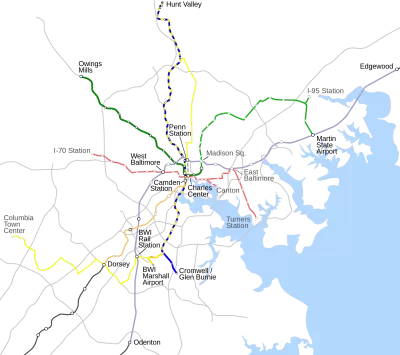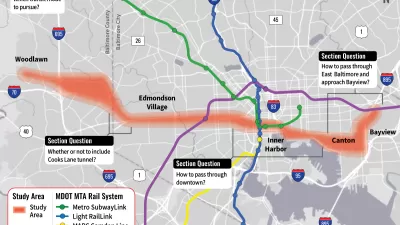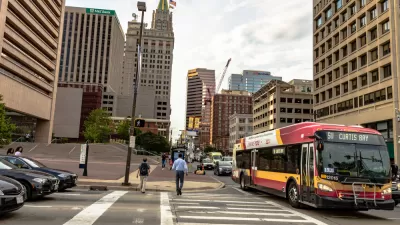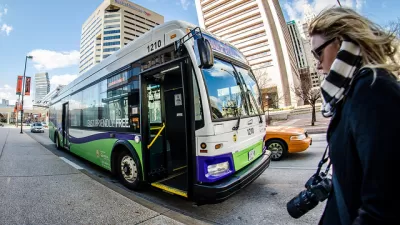The unique structure of the Maryland Transit Administration leaves local stakeholders out of decision-making.

A new report from the Eno Center for Transportation highlights the unique nature of the governance of Baltimore's transit system, the only one of the country's 50 largest state-run transit agencies to operate without a board of directors or local funding. Depending exclusively on federal and state funds, writes Alex Holt in Greater Greater Washington, makes Baltimore "uniquely vulnerable to the whims of each passing Maryland governor."
The report strongly recommends reform, emphasizing the importance of transit governance in determining a system's responsiveness to community needs. Governed by a single administrator, the Maryland Transit Administration (MTA) finds itself at a disadvantage when competing with other state agencies and regions (including the Washington, D.C. metropolitan area) for funding and support. The structure also gives the governor the power to make important decisions about local transit without additional oversight. With transit projects often needing up to a decade to get off the ground, leaving decisions up to governors means many projects get scrapped or forgotten as administrations change.
To remedy the situation, the report presents three possible solutions modeled on Boston, Pittsburgh, and Minneapolis. The suggestions include establishing transit oversight boards, installing a state-level board of directors, and forming a new, more comprehensive transit authority that includes funding and representation from multiple jurisdictions. While some solutions are faster and cheaper than others, the Eno Center report makes clear that the MTA needs drastic reform and more local control in order to effectively serve Baltimore's citizens.
FULL STORY: MTA’s transit governance isn’t working for Baltimore, a new report says

Maui's Vacation Rental Debate Turns Ugly
Verbal attacks, misinformation campaigns and fistfights plague a high-stakes debate to convert thousands of vacation rentals into long-term housing.

Planetizen Federal Action Tracker
A weekly monitor of how Trump’s orders and actions are impacting planners and planning in America.

In Urban Planning, AI Prompting Could be the New Design Thinking
Creativity has long been key to great urban design. What if we see AI as our new creative partner?

King County Supportive Housing Program Offers Hope for Unhoused Residents
The county is taking a ‘Housing First’ approach that prioritizes getting people into housing, then offering wraparound supportive services.

Researchers Use AI to Get Clearer Picture of US Housing
Analysts are using artificial intelligence to supercharge their research by allowing them to comb through data faster. Though these AI tools can be error prone, they save time and housing researchers are optimistic about the future.

Making Shared Micromobility More Inclusive
Cities and shared mobility system operators can do more to include people with disabilities in planning and operations, per a new report.
Urban Design for Planners 1: Software Tools
This six-course series explores essential urban design concepts using open source software and equips planners with the tools they need to participate fully in the urban design process.
Planning for Universal Design
Learn the tools for implementing Universal Design in planning regulations.
planning NEXT
Appalachian Highlands Housing Partners
Mpact (founded as Rail~Volution)
City of Camden Redevelopment Agency
City of Astoria
City of Portland
City of Laramie





























